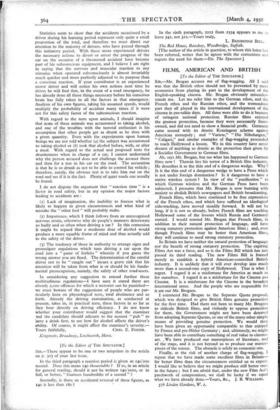FILMS, AMERICAN AND BRITISH
[To the Editor of THE SPECTATOR.] Sta,—Mr. Brogan accuses me of flag-wagging. All I said was that the British ethos should not be prevented by mere economics from playing its part in the development of the English-speaking cinema. Mr. Brogan obviously misunder- stands me. Let me refer him to the German ethos, and the French ethos and the Russian ethos, and the tremendous part they all played in the international development of the cinema in pre-talkie days. All three were able to do it because of stringent national protection. Russian films enjoyed the greatest protection, because they were necessarily State- owned, and did not need to show a financial profit. Germany came second with its drastic Kontingent scheme against American monopoly ; and " Variete," " Die Nibelungen," " Caligari," and similar examples of flag-wagging proceeded to teach Hollywood a lesson. We in this country have never dreamt of anything so drastic as the protection then given by a Socialist Government to German films.
Ali, says Mr. Brogan, but see what has happened to German films now ! Therein lies his terror of a British film industry. He describes it as the thin end of a dangerous wedge. Why ? Is it the thin end of a dangerous wedge to have a Press which is not under foreign domination ? Is it dangerous to have a native wireless system ? In view of the " purification " to which German wireless and the German Press have been subjected, I presume that Mr. Brogan is now burning with anxiety to abolish British newspapers and British broadcasting.
French films, which have continued to -be free expressions of the French ethos, and which have suffered no ideological side-tracking, have moved steadily forward. It will not be long, if it is not so already, before French films are teaching Hollywood some of the lessons which Russia and Germany started. I would remind Mr. Brogan that French films, in addition to their natural protection of language, still have strong statutory protection against American films ; and, even though French films may be better than American films, they will continue to need strong statutory protection.
In Britain we have neither the natural protection of language nor the benefit of strong statutory protection. The expiring Films Act was a farce, and so is the Films Bill which has just passed its third reading. The new Films Bill is framed merely to establish . a hybrid American-controlled British industry. It is unlikely that it will ever develop into much more than a second-rate copy of Hollywood. That is what I regret. I regard it as a misfortune for America as much as for ourselves. I regard it as a misfortune for the Cinema qua Cinema. It is a misfortune for the Cinema in the broadest international sense. And the people who are responsible for it are our Mr. Brogans.
I commend Mr. Brogan to the Separate Quota proposal, which was designed to give British films genuine protection for the first time. Had there not been so many Mr. Brogans to ridicule British films, and violently to oppose protection for them, the Government might not have been deterred from adopting Separate Quotas, or one of the many other simple means of providing genuine protection. We would then have been given an opportunity comparable to that enjoyed by France and pre-Hitler Germany ; and, ultimately, we might have been able to contribute something of real value to cinema- art. _ We have produced our masterpieces of literature, and of the stage, and it is not beyond us to produce our master- pieces of the screen. The obstacle is solely an economic one.
Finally, at the risk of another charge of flag-wagging, I repeat that we have made some excellent films in Britain— far better films than the circumstances entitled us to expect. I would like to believe that we might produce still better ones in the future ; but I am afraid that, under the new Film Act's patchwork of compromises, we shall be lucky if we equal what we have already done.—Yours, &c., J. B. WILLIAMS.
57b Linden Gardens, W. 2.






































































 Previous page
Previous page